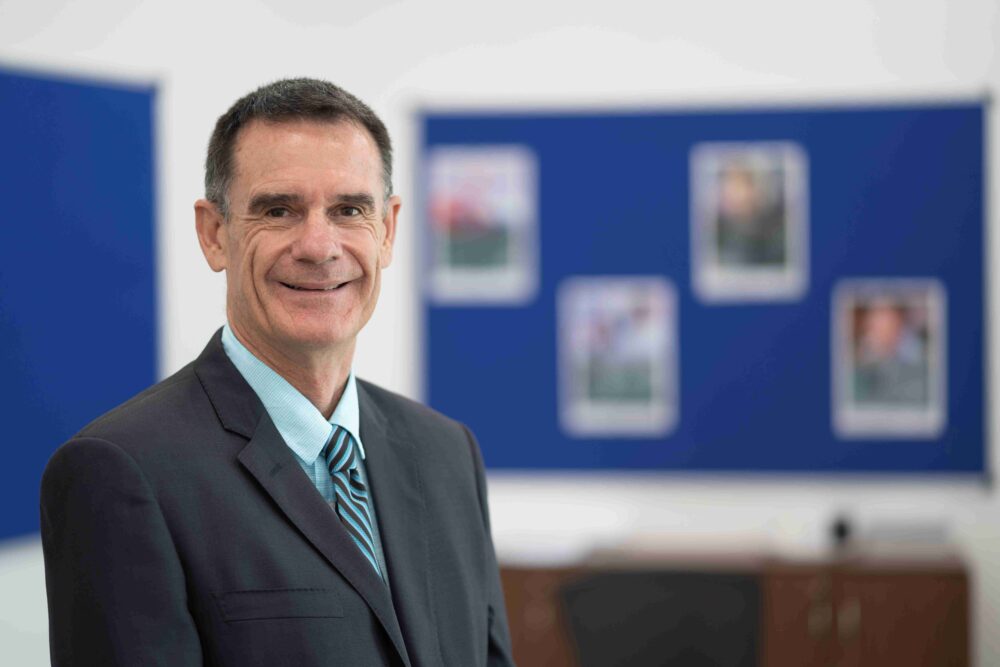Dene Bright was appointed as Principal of Reach British School in February 2017. Prior to his appointment to Reach, he has spent more than 30 years working in a wide range of educational settings and brings with him an extensive background in school leadership and school improvement.
He grew up in Perth, Australia and obtained his teaching degrees from Edith Cowan University, Australia.
Dene has worked as a school principal for many years and has been a school leadership advisor across several GCC countries. Previously, he has also worked in Egypt, Saudi Arabia, Qatar, Fiji, Canada, Africa and schools across Western Australia.
Dene has developed curriculum materials and learning programmes for students located across the globe, having worked in the specialised field of distance education in Australia. He was on the national executive board of distance learning schools across Australia.
Reach lured him away with the prospect of returning to Abu Dhabi where he previously worked as part of an ADEK school reform and improvement project.
He has a son and a daughter who keep him young and focused on what today’s students need for the future global workforce. He is working hard to find time to add to his list of 56 countries he’s already visited and to reduce his golf handicap on the wonderful golf courses in Abu Dhabi.
Dene spoke to Education Middle East about his experiences as an educationist, his goals for the school and how teachers can excel in their careers.
Your career in education spans the Middle East, Africa, Canada and Australia. What according to you are the most common practices and differences in learning in these places?
With my experience across nine countries, I see collaborative learning strategies as key life skills for students. These, partnered with good communication, problem-solving and teamwork skills, are central in preparing students for the future. Together, all these skills form the base of teaching practices seen across many countries. The difference, I have seen, is in how these skills are adapted both culturally and contextually to be relevant to students in these countries.
Tell us about your stint at Reach British School. What are the goals you set out to achieve when you joined and any impediments you faced along the way?
When I joined Reach British School, it was a very different school from what it is now. As part of International Schools Partnership (ISP), our goal for the school has always been to make Reach a first-choice school for all the students in our community. To achieve this our focus has been on getting better, placing a strong emphasis on student learning and progress, developing an effective distributed leadership model, developing teacher knowledge and creating a positive school culture with a strong capacity to self-evaluate along the way. I also wanted to make sure that we create a community that is committed to and proud of its school. We are definitely moving in the right direction. This is evidenced through the positive feedback received in our parent surveys, our Distance Learning provision receiving the highest possible ADEK rating of Developed, and most recently the school receiving British School Overseas (BSO) accreditation with many features being rated excellent and very good.
What do you enjoy the most about your role as the head of a school?
Without question, the students, and my opportunity to interact and make a difference in their daily lives, is the best part of my job as a Principal.
Do you see any problems arising from the prolonged absence of students from physical school due to the pandemic?
The research is very clear- every lesson counts every day. There is a direct correlation between attendance and progress and attainment. Students are also impacted socially when not in school, and they become unfamiliar with routine. These are important tools in their development and need to be nurtured. I believe that strengthening the partnership with the parent community is key to maximizing student attendance.
Is digital learning here to stay?
Schools now are equipped with digital learning tools and need to continue to be flexible to switch to remote learning if circumstances change at any point. Digital learning has made so much progress over the last year that it has become a permanent teaching and learning tool in schools. At Reach British School we have been using it to create additional study options for students, giving them the flexibility to learn differently and at their own pace.
According to you, what are the qualities teachers should possess to excel in their careers?
I love talking to students both formally and informally. Often the conversations are about teachers. Over the years I have found that students value a range of qualities in their teachers. The qualities that stand out when students reflect on the best teachers they ever had at school, are teachers who:
- Were fair
- Had a sense of humour
- Had passion and competence for teaching
- Listened
- Were interesting, kind and funny
- Cared for and valued learning
- Were unpredictable and passionate
- Walked around the room lots








